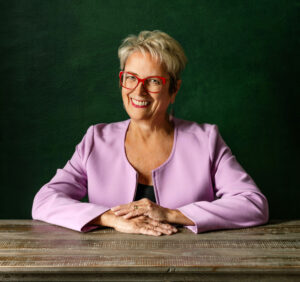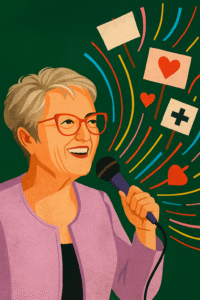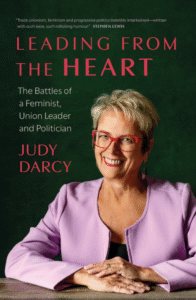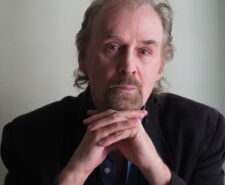Hear me roar
From the girl in grade one leading school assemblies to the college student crashing a sexist beauty contest, an officer in Canada’s largest union and a provincial cabinet minister championing Medicare, Judy Darcy left her mark.
October 01st, 2025

Judy Darcy is a Canadian health care advocate, union leader and former BC cabinet minister.
“I believed with every fibre of my being that Medicare was a sacred trust, that we couldn’t go back to a system where they checked your purse before your pulse.”
Review by Sonja Pinto
Not many can reflect on a career as distinguished and eventful as Judy Darcy. A passionate unionist, feminist and activist, Darcy’s memoir details the raucous and demanding highlights of her extensive career in the public eye.
Darcy is a natural-born leader whose oratory gifts were discovered as early as grade one when her teachers began assigning her “an official role at the weekly assemblies” where she was asked to “read the Lord’s Prayer, recite the salute to the flag (the Union Jack) or lead the singing of ‘God Save the Queen,’” roles that the young Darcy “performed with gusto.” These formative moments set the stage for “a lifetime of public speaking—of learning to use words, tone of voice, and stories to communicate ideas, evoke emotions, inspire people to action.”
Darcy, who spent the majority of her childhood in Sarnia, Ontario’s “Chemical Valley,” is shaped by the secrets of her family’s history. Her father kept his Jewish identity a secret for most of her life, scarred by the trauma of the Holocaust. Her mother was once part of the Danish Resistance during World War II, but later developed mental health and addiction struggles that led her to suicide. It is her mother’s tragic passing that later fuelled Darcy’s mission to end overdose deaths during her time as the NDP’s Minister of Mental Health and Addictions.
As a college student, she found her place in the growing feminist movement: “It is a time when more doors are opening for women—but also when traditional notions of beauty still reign supreme.” Her tight-knit feminist community leveraged this social currency to crash a beauty pageant for exploiting women as Darcy recounts in an anecdote where she goes undercover to be a Miss Canadian University contestant.
Never one to shy away from challenge or controversy, Darcy’s activism leads her to fight for causes like women’s rights, labour rights, access to safe birth control and abortions, and immigrant and migrant worker’s rights.
This activism doesn’t come without harsh criticism. Opponents call her a radical, a communist and a “gape-mouthed, bull-horn blowing” union boss. Though her actions are perceived as extreme—and even subversive—Darcy recalls that “most of what we actually did was feed people.”
Darcy first becomes involved with Canadian Union of Public Employees as a photocopier technician at a University of Toronto library. Here, she and her colleagues develop frequent headaches resulting from the blue light emanating from the photocopiers. With the help of her union rep, Darcy convinces the supervisor to supply staff with sunglasses, a simple but effective solution to prevent the headaches. This proves to be Darcy’s first union win: “so began my lifelong passionate affair with my union,” writes Darcy.
She becomes more and more involved with CUPE, speaking at conferences and events to advance labour rights, with a focus on women’s issues. Once, as one of the few women attending a high-level conference, she faced difficulty accessing childcare and turned the obstacle into an opportunity to advocate for free childcare at union events.
Learning how to balance being a spokesperson for her workplace with her own visions and opinions on the future, Darcy learns many hard lessons along the way. After it gets out that she is a communist whilst at a CUPE conference, Darcy goes from getting a “standing ovation one day to being booed off the floor the next!”
Indeed, the union isn’t free of its own prejudices. Misogyny is common among the membership. Darcy reveals some of the cutting comments she had to withstand as she navigated union leadership positions, such as being told that “real union leaders don’t cry.”

Illustration by Brian Nguyen
Despite every hurdle, Darcy built a reputation as a competent, passionate and influential speaker. By the age of 39, she says: “I am now a national officer of Canada’s largest union—only the second woman in the country to ever serve in such a role.”
Darcy excelled at both the pragmatic and the emotive parts of her leadership positions. For instance, recognizing the need to convince her membership of the importance of paying dues on time, she used her voice to communicate the problem simply but persuasively: “finances pump blood into our beating heart—the healthier the blood and the steadier the rhythm, the stronger our union will be.”
In tough times when CUPE locals were striking, Darcy marched with her brothers and sisters: “… leaders have to lead from the front,” she writes. “That’s the only way to keep members’ trust, reduce risk and achieve the best possible outcome.”
After many years in CUPE leadership, Darcy eventually entered the world of politics, becoming a BC NDP MLA to continue pushing for change. “Together we went to bat for hundreds of people,” crows Darcy. With the help of her team, she moved the needle on Medicare “I believed with every fibre of my being that Medicare was a sacred trust,” she says, adding “that we couldn’t go back to a system where they checked your purse before your pulse.”
Defending public health invigorates Darcy: “It infuriates me that many politicians on the right don’t believe Medicare should provide coverage for us as whole human beings: our minds, our teeth, our bodies as we age.”
It is partly this advocacy for public health that led her to be appointed BC’s first Minister of Mental Health and Addictions in 2017, an extremely challenging role that tested her mentally and physically. Darcy and her team rolled out overdose prevention campaigns and visited safe consumption sites and treatment centres like the Indigenous-led Ts’ewultun Health Centre.
This work hit an emotional chord for Darcy. “I understood that my mother’s death gave me the power to feel what families in BC were feeling, to hear what they were saying,” she writes. “And to move from pain to action.”
 Perhaps the most moving parts of Leading from the Heart: The Battles of a Feminist, Union Leader and Politician (D&M $40) come from Darcy’s ability to reflect on the mistakes and regrets she has about her career. She reflects thoughtfully on ways she could have improved and better served the community, showing striking vulnerability, conscience and integrity.
Perhaps the most moving parts of Leading from the Heart: The Battles of a Feminist, Union Leader and Politician (D&M $40) come from Darcy’s ability to reflect on the mistakes and regrets she has about her career. She reflects thoughtfully on ways she could have improved and better served the community, showing striking vulnerability, conscience and integrity.
To read her memoir is to understand the ambition and perseverance that fuelled Darcy’s success as a speaker and a leader. As a writer, she channels these same strengths in creating this absolutely captivating memoir. 9781771624534
Sonja Pinto is a writer, photographer, printmaker and book reviewer. They reside on the unceded territories of the lək̓ʷəŋən peoples (Victoria, BC).


I have known Judy Darcy since the early 1970s, and she is a great storyteller and fighter. She put her heart into everything and has a passion for always helping the underdog.
Judy’s laughter tells it all. It reflects a wonderful and intelligent woman who wanted to make a difference. This book is a great read over the holidays. Enjoy!